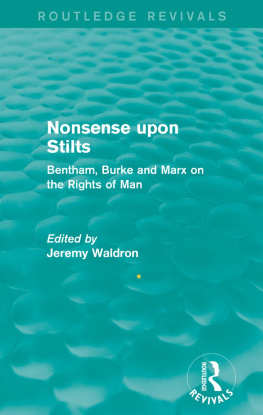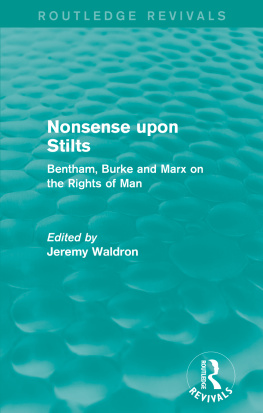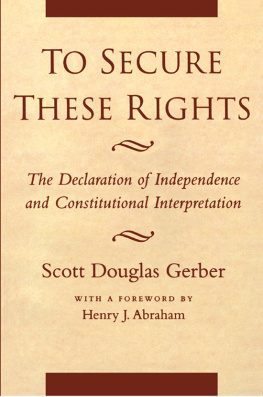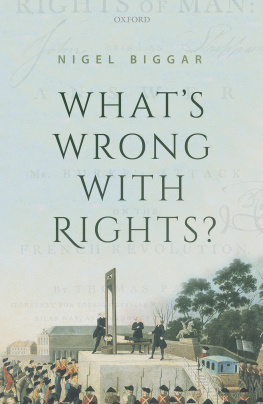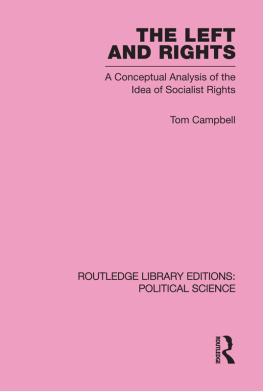Jeremy Waldron - Nonsense Upon Stilts: Bentham, Burke and Marx on the Rights of Man
Here you can read online Jeremy Waldron - Nonsense Upon Stilts: Bentham, Burke and Marx on the Rights of Man full text of the book (entire story) in english for free. Download pdf and epub, get meaning, cover and reviews about this ebook. year: 1987, publisher: Routledge, genre: Politics. Description of the work, (preface) as well as reviews are available. Best literature library LitArk.com created for fans of good reading and offers a wide selection of genres:
Romance novel
Science fiction
Adventure
Detective
Science
History
Home and family
Prose
Art
Politics
Computer
Non-fiction
Religion
Business
Children
Humor
Choose a favorite category and find really read worthwhile books. Enjoy immersion in the world of imagination, feel the emotions of the characters or learn something new for yourself, make an fascinating discovery.
- Book:Nonsense Upon Stilts: Bentham, Burke and Marx on the Rights of Man
- Author:
- Publisher:Routledge
- Genre:
- Year:1987
- Rating:5 / 5
- Favourites:Add to favourites
- Your mark:
Nonsense Upon Stilts: Bentham, Burke and Marx on the Rights of Man: summary, description and annotation
We offer to read an annotation, description, summary or preface (depends on what the author of the book "Nonsense Upon Stilts: Bentham, Burke and Marx on the Rights of Man" wrote himself). If you haven't found the necessary information about the book — write in the comments, we will try to find it.
Natural rights is simple nonsense: natural and imprescriptible rights, rhetorical nonsense - nonsense upon stilts. - Jeremy Bentham
In Nonsense upon Stilts, first published in 1987, Waldron includes and discusses extracts from three classic critiques of the idea of natural rights embodied in the 1789 Declaration of the Rights of Man and the Citizen. Each text is prefaced by an historical introduction and an analysis of its main themes. The collection as a whole in introduced with an essay tracing the philosophical background to the three critiques as well as the eighteenth-century idea of natural rights which they attacked.
But the point of reproducing these works is not merely historical. Modern attacks on rights-based political philosophy mirror the concerns of Bentham, Burke and Marx. Jeremy Waldron has therefore added an extensive concluding essay which relates these classic texts to the modern discussion of rights and re-examines the idea of rights in the light of contemporary critiques. This text provides an invaluable teaching tool for courses in politics and philosophy.
What are rights and who can grant them? Can they be taken away? Are they defined and prescribed by law, or are they inherent in nature?
In the long-awaited new edition of Nonsense Upon Stilts, Jeremy Waldron addresses all of these enduring and timely questions, while making accessible to students four fundamental but seldom read texts in the literature on human rights. He includes and discusses extracts from three classic critiques of the idea of natural rights embodied in the 1789 Declaration of the Rights of Man and the Citizen, Benthams Anarchical Fallacies, Burkes Reflections on the Revolution in France and Marxs On the Jewish Question, as well as the whole of the declaration itself. Each text is prefaced by a historical introduction and an analysis of its main themes, showing how these issues are as pertinent and controversial today as they were at the time of the French Revolution. The collection as a whole is introduced with an essay tracing the philosophical background to the three critiques as well as the idea of natural rights which they attacked.
Over twenty years after the publication of the first edition, Waldron has revisited Nonsense Upon Stilts to relate these classic texts to the modern discussion of rights, addressing topical issues such as individual rights versus public security in the context of the war on terror; the impact of economic globalisation on human rights; and the difficulty of defining universal human rights across diverse cultures and religious sytems and in a variety of very different human situations.
Nonsense Upon Stilts provides an invaluable teaching tool for courses in human rights, political philosophy, moral philosophy, the history ideas, and legal theory. It should be read by anyone who thinks there is a difference between taking rights seriously and taking them for granted.
Jeremy Waldron is Professor of Law at the New York University Law School and Chichele Professor in Social and Political Theory at All Souls College University of Oxford Columbia University.
Jeremy Waldron: author's other books
Who wrote Nonsense Upon Stilts: Bentham, Burke and Marx on the Rights of Man? Find out the surname, the name of the author of the book and a list of all author's works by series.

